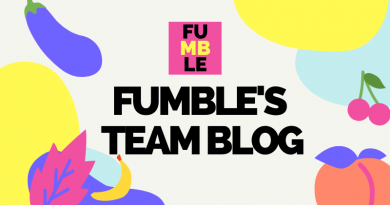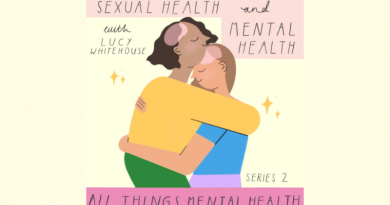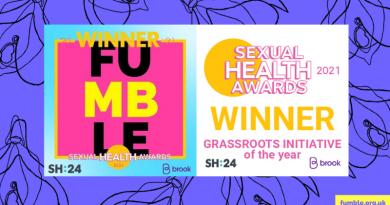Women’s Health Strategy 2021: Fumble’s response
The UK government called for evidence for a new Women’s Health Strategy in June 2021 – here’s Fumble’s response, led by a group of our volunteers
In everything we do, young people are at the centre of Fumble. We’re responding to the Women’s Health Strategy consultation because we want to make sure girls’ and young women’s voices are heard.
Fumble is a UK charity that provides safe and healthy digital content for young people about issues relating to sex, relationships, healthy bodies, mental health, and identity. In 2020, we estimate that we reached 350,000 young people online. We achieved this through quality relationships, sex and health (RSHE) education content. Fumble ensures young people have the skills and knowledge to successfully manage their sexual health, relationships, and mental health today.
For this response, we spoke to girls and young women who volunteer for Fumble or have used our platform. 15 volunteers contributed to this response, and we have also included insights from our public survey of more than 200 young people across the UK, which took place in November 2020.
The Women’s Health Strategy call for evidence seeks views on six core themes. We’re responding to three of these themes:
- Placing women’s voices at the centre of their health and care,
- Improving quality and accessibility of information and education on women’s health,
- Understanding and responding to the impacts of COVID-19 on women’s health.
Theme 1: Placing women’s voices at the centre of their health and care
Young women and girls are not always listened to by healthcare professionals
Women’s voices are not always heard in the UK health and care system. Young women and girls in particular are often dismissed by healthcare professionals who do not take their symptoms seriously. This can lead to delays in essential diagnoses and treatments.
When surveyed, one of our female volunteers said she experienced “terrible period pain” but was simply told “it wasn’t a real medical problem, every woman has this”. Extreme period pain can be a symptom of various gynaecological conditions, for which treatments are available, including vaginismus and endometriosis. According to Endometriosis UK, 1 in 10 women of reproductive age suffer from this condition. Yet it takes an average of 7.5 years to receive a diagnosis for endometriosis in the UK.
Recommendations
We recommend that young women and girls are included meaningfully in designing the health care they need. We also recommend that the government invests in the support and information available to young women and girls, to complement their direct health care. This especially includes digital resources that put their voices at the heart of a quality peer-to-peer approach. For example, those we provide at Fumble. The pandemic has highlighted the crucial importance of remote advice, information and support for young women and girls. It has also emphasised the need for relevant, quality and accessible resources.
Stigmas about women’s health issues, such as periods, contraception and mental health, prevent open discussion which damages women’s health
Periods
Young girls and women may not access the help and support they need due to the stigma of female-related health concerns, such as periods. In 2018, Plan International UK surveyed 1,004 girls aged 14-21 who had started their period. They found that 79% had experienced period symptoms that concerned them, but had not consulted a doctor. For 27% of these women, this was due to embarrassment and shame concerning their symptoms.
Contraception
In a recent survey we conducted with Fumble supporters, many respondents felt stigmatised by healthcare professionals for using contraception. For example, one young woman said a healthcare worker was extremely judgemental when she bought the morning-after pill. This type of attitude becomes a barrier to access and means women can be shamed out of accessing necessary care.
Mental health and wellbeing
Girls and young women may also struggle to discuss their mental health openly with their GP. As part of our research in November, one of our volunteers told us that she feared “being labelled as an emotional female, typical of our sex to over-think and be upset”, which prevented her from accessing essential mental health care.
Recommendations
We can overcome the gender-related stigma in healthcare by teaching healthcare workers how to appropriately discuss health issues with women and girls. We can also teach young women about their own health and give them the appropriate language to advocate for themselves.
Fumble discusses these ‘uncomfortable’ topics on all of our platforms and social media channels. We help overcome the stigma that surrounds female healthcare concerns by discussing issues that are otherwise avoided and overlooked. We also support young women and girls to understand how to access essential healthcare.
Theme 2: Improving the quality and accessibility of information and education on women’s health
Young women and girls have limited access to quality education on their health
Many young women and girls do not talk about their health with healthcare professionals or family and friends, as they do not have the prior knowledge required or the appropriate language to talk definitively about their health
Contraception
In our survey, girls and young women who use Fumble have told us their healthcare provider did not discuss the side effects of hormonal birth control, such as depression and blood clots. It is essential that healthcare professionals highlight these serious side effects, so women can make informed decisions about their health and wellbeing.
Sexuality
Women who identify as lesbian and bisexual can sometimes experience barriers to health care as a result of their sexuality. A report by Public Health England Screening found that 15% of lesbian and bisexual women over 25 have never had a cervical screening test compared to 7% of women over 25 in general. PHE found that this lower uptake may be due to the myth that women who have sex with women do not need regular cervical screenings.
Young women and girls access information about their health online
According to a recent survey from Girlguiding, 44% of girls and women aged 13 to 21 discuss the issues that are important to them online. Young women and girls need accessible and relevant information about health issues, such as puberty, periods, and contraception. Yet there is limited safe and high-quality information for young people about their relationships, bodies, and health online.
Our female volunteers and users have expressed how important Fumble is in creating relatable online resources for young people across the UK. When surveyed, one young woman expressed that Fumble’s content regularly helps her “learn something new about her body, health and the wider world of sex and relationships”. Another said that Fumble had empowered her to access healthcare. She says she now knows how to hold her ground and find the best option for her without feeling dismissed.
Recommendations
Evidently, we need to focus on providing accessible and realistic information for the next generation of women. A recent participant in our survey stated that she was aware of female health issues because of social media, and that “without it, there’s nothing really on the TV apart from advertisements about periods, which is of course important but the health issues women face [are] numerous.” This shows the need for relatable, youth-oriented resources, especially on women’s health, and especially online, such as those Fumble provides.
Theme 3: Understanding and responding to the impacts of COVID-19 on women’s health
COVID-19 has impacted women’s health
There is significant evidence to suggest that Covid-19 has negatively impacted women’s health during the pandemic, particularly their mental health.
In 2020 we surveyed young women and asked them what they struggled with during the pandemic. Nearly half of the participants said they struggled the most with their mental health. One woman suggested healthcare services should consider the “emotional needs” of young people across the UK during this unsettling time. Another felt there was insufficient support for people who were lonely and isolated.
We also asked young women how they accessed support for their mental health during the pandemic. We discovered that many of them found relatable information from social media platforms. This again emphasises the importance of relevant, quality and accessible online resources to support women’s mental health during the recovery from the pandemic.
COVID-19 has also impacted women’s health services, including innovation in service delivery
The women we surveyed turned online for support, as they felt uncomfortable speaking about their mental and sexual health with those they lived with during lockdown. During the pandemic, some sexual health services were delivered remotely, such as STI postal kits and some advice and treatment delivered over the phone. Fumble supports this improvement in access to essential healthcare, and we recommend these provisions continue indefinitely.
Recommendations
It is clear that we need to keep supporting young women’s health during the recovery from the pandemic. We advocate continued training for staff on mental health care provision and more remote healthcare services to improve accessibility. We also encourage further funding into youth services that respond to the physical, sexual and mental health needs of young women and girls today. Fumble provides a safe online environment for young women to navigate pre-existing challenges, and the new challenges caused by the pandemic. Fumble does this by offering workshops and digital resources, which are accessible and relatable, to support their physical, sexual and mental health, their relationships, and their emotional and social development.
Want to know more about the impact of the pandemic?
Our pandemic support series looks into young people’s experiences of COVID-19. Discover all of our pandemic content here.
Other support
Relate to the issues raised in this article? Check out these websites for advice and support right now:
- Brook: Help & Advice -Sexual health and wellbeing advice
- Mind – Mental health support
- Latest UK Covid-19 Government Guidelines
- One Space – Mental health support for under 25s
- Switchboard – LGBTQ+ helpline
Read more
Last Reviewed 18 October 2023
Image Credit: Fumble





